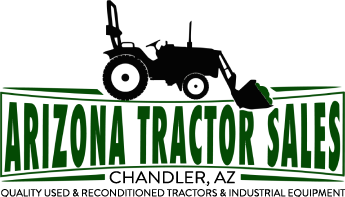Essential Tractor Safety Practices: Tips from Arizona Tractor Sales
Operating a tractor involves more than just maneuvering heavy machinery; it requires vigilance, training, and adherence to safety protocols to prevent accidents and ensure smooth operations. At Arizona Tractor Sales, we prioritize your safety and well-being. In this blog, we’ll discuss key safety practices to follow when operating tractors and how to maintain a safe work environment.
Why Tractor Safety is Crucial
1. Protecting Operators and Workers
Safety practices are vital for preventing injuries and accidents on the job site. Tractors are powerful machines that can pose serious risks if not handled properly. Adhering to safety protocols helps ensure the well-being of operators and anyone else working in proximity.
2. Avoiding Equipment Damage
Proper safety measures also protect your equipment from unnecessary wear and damage. By following safety guidelines, you extend the lifespan of your tractor and reduce the risk of costly repairs.
3. Enhancing Efficiency
A safe and well-maintained work environment leads to more efficient operations. When operators are confident in their safety, they can focus on their tasks, resulting in better performance and productivity.
Top Tractor Safety Practices
1. Pre-Operation Inspections
a. Conduct Routine Checks: Before operating your tractor, perform a thorough inspection to ensure all components are in working order. Check fluid levels, tire condition, and hydraulic systems for any signs of leaks or damage.
b. Verify Safety Equipment: Ensure that safety equipment such as seat belts, ROPS (Roll Over Protection Structures), and mirrors are in place and functioning correctly. These features are crucial for protecting operators during operation.
2. Proper Training and Certification
a. Operator Training: Ensure that all operators are adequately trained and certified to use the tractor. Training should cover operational procedures, safety practices, and emergency protocols.
b. Continuous Education: Regularly update training programs and conduct refresher courses to keep operators informed about the latest safety practices and equipment updates.
3. Safe Operating Procedures
a. Follow Manufacturer’s Guidelines: Adhere to the manufacturer’s operating manual and safety guidelines. Each tractor model has specific instructions for safe use and maintenance.
b. Maintain Clear Visibility: Always ensure that you have a clear view of the work area and avoid blind spots. Use mirrors and cameras if available to enhance visibility and avoid collisions.
4. Safe Handling of Loads
a. Secure Loads Properly: When transporting materials, ensure that loads are secured and balanced. Use straps, chains, or other securing devices to prevent shifting or falling.
b. Avoid Overloading: Never exceed the tractor’s rated load capacity. Overloading can affect stability and control, leading to potential accidents.
5. Operating on Slopes
a. Navigate Slopes Cautiously: When working on inclines or uneven terrain, operate the tractor slowly and carefully. Avoid sharp turns or sudden movements that could cause tipping.
b. Use Proper Attachments: Ensure that attachments are securely fastened and suitable for the task at hand. Properly configured equipment helps maintain stability on slopes.
6. Emergency Preparedness
a. Know Emergency Procedures: Familiarize yourself with emergency procedures and the location of emergency shut-off controls. In case of an accident or equipment failure, quick action can prevent further issues.
b. Keep First Aid Supplies: Have a first aid kit readily available on-site. Regularly check and restock supplies to ensure they are up-to-date and functional.
7. Regular Maintenance
a. Schedule Routine Maintenance: Follow a regular maintenance schedule to keep your tractor in optimal condition. Address any issues promptly to prevent breakdowns and ensure safe operation.
b. Professional Inspections: Periodically have your tractor inspected by a professional to identify and address any potential safety concerns.
How Arizona Tractor Sales Supports Safety
1. Expert Guidance: Our team at Arizona Tractor Sales is committed to providing you with the best advice and resources for tractor safety. We offer guidance on proper operation and maintenance practices to ensure your equipment remains safe and efficient.
2. Quality Equipment: We offer high-quality tractors and attachments designed with safety features to enhance your operational safety. Our equipment is built to meet stringent safety standards.
3. Comprehensive Support: From training resources to professional service, we’re here to support you in maintaining a safe and productive work environment. Contact us for any questions or concerns about tractor safety.
For more information on tractor safety practices or to explore our range of equipment, visit www.arizonatractorsales.com or call us at (602) 377-2850. Your safety is our priority, and we’re here to help you ensure a safe and successful operation.
Conclusion
Tractor safety is essential for protecting operators, equipment, and the overall efficiency of your operations. By following these key safety practices and maintaining a proactive approach to safety, you can prevent accidents and ensure a productive and secure work environment. Thank you for choosing Arizona Tractor Sales—we’re dedicated to supporting your safety and success in every aspect of your equipment use!

